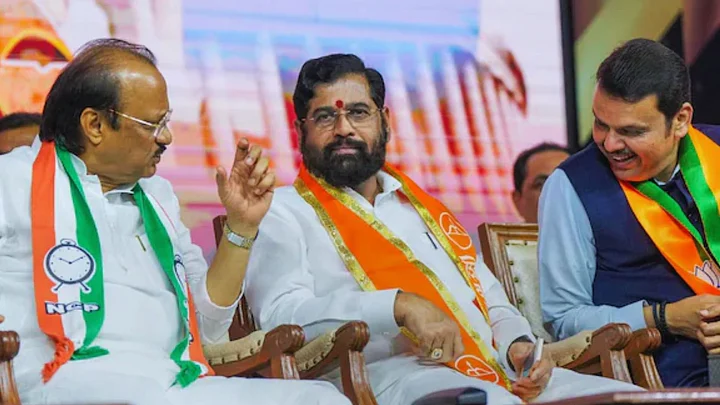Will the Bharatiya Janata Party (BJP) regret splitting the Shiv Sena and the Nationalist Congress Party (NCP)? Should the Uddhav Thackeray-led Maha Vikas Aghadi (MVA) government have been allowed to continue for the full term, allowing internal contradictions to come to the fore?
The insistence on having a BJP-dominated government in Maharashtra, the Mahayuti, seems to have created problems for the party. This was first seen in the Lok Sabha election.
Now, with the Assembly polls scheduled for 20 November, the Mahayuti is facing quite some turmoil, with Eknath Shinde and Ajit Pawar's clear message to the BJP: you cannot come to power without us.
A section of the BJP, as well as the RSS, is upset over the BJP doing business with the controversial Ajit Pawar, whom it had accused of monumental corruption and promised to put him in jail whenever it comes to power. Instead, Ajit is an honourable member of the Mahayuti and the deputy chief minister in the government.
On the other hand, Amit Shah's reported statement in the first week of October during the party workers' meeting that the BJP would come to power in the state "on its own" in 2029, was a message to Shinde and Pawar that they are expendable.
Shinde has asserted that Uddhav Thackeray deviated the party from Hindutva and Bal Thackeray's vision. But Amit Shah's statement made it plain that the BJP is not interested in carrying Shinde's brand of Hindutva either.
In no circumstance will the BJP allow Shinde's Sena and Ajit Pawar's NCP to grow at its own cost. Its larger objective is that both Shiv Senas and NCPs are pushed to the margins, after which there would be a one-on-one between the BJP and the Congress, like in Gujarat, Madhya Pradesh, Rajasthan, Chhattisgarh, and Himachal Pradesh.
There are case-by-case issues within the seat-sharing negotiations as well. Ajit Pawar has announced the candidature of Sana Malik, daughter of party veteran Nawab Malik, from the Anushakti Nagar assembly constituency.
Her father, who was vying for the nomination from the Mankhurd-Shivajinagar constituency, may not get it following strong objections raised by Fadnavis and state BJP president Chandrashekhar Bawankule. The BJP had earlier alleged that Nawab has links with Dawood Ibrahim.
In Thane, the home district of the CM, the BJP has taken him by surprise by nominating Sulabha, wife of BJP MLA from Kalyan East Ganpat Gaikwad, now in jail for allegedly shooting a Shinde Sena activist early this year.
The BJP may cede some more seats to Shinde's Sena and Ajit Pawar's NCP, but it will not allow them to get the entire political space of their parent parties. After all, those who have parted ways with the original Shiv Sena have not done well electorally. Within the NCP, it goes without saying that the uncle is a far bigger and better tactician and strategist.
This, therefore, is the era of the politics of convenience, and Maharashtra is paying the price for that. The state has to suffer from political opportunism; defectors are not just attaining positions of power but are making money.
One more key factor is Eknath Shinde's growing popularity. Schemes like the Ladki Bahin Yojana for women, the Ladka Bhau scheme for young men, and a farm loan waiver have worked in his favour.
Some might even say that he is leading the alliance and the BJP needs him more than he needs the BJP, despite all the talk about him being Fadnavis's 'puppet CM' when they came to power after toppling Uddhav. Shinde has turned out to be resourceful and accessible.
The BJP has projected itself as the elder brother, and thus, sought more seats. But Shinde is smartly projecting his Shiv Sena as an equal partner based on the number of Lok Sabha seats his party won in June.
But net-net, the BJP has failed to stabilise its fortunes in Maharashtra, despite becoming the numero uno ten years ago with the emergence of Modi at the national level. All this begs the question: Has the BJP created a Frankenstein by relying on Shinde’s Sena and Ajit’s NCP for temporary gains?
(Sunil Gatade is a former Associate Editor of the Press Trust of India. Venkatesh Kesari is an independent journalist. This is an opinion article and the views expressed are the author’s own. The Quint neither endorses nor is responsible for them.)
(At The Quint, we question everything. Play an active role in shaping our journalism by becoming a member today.)
